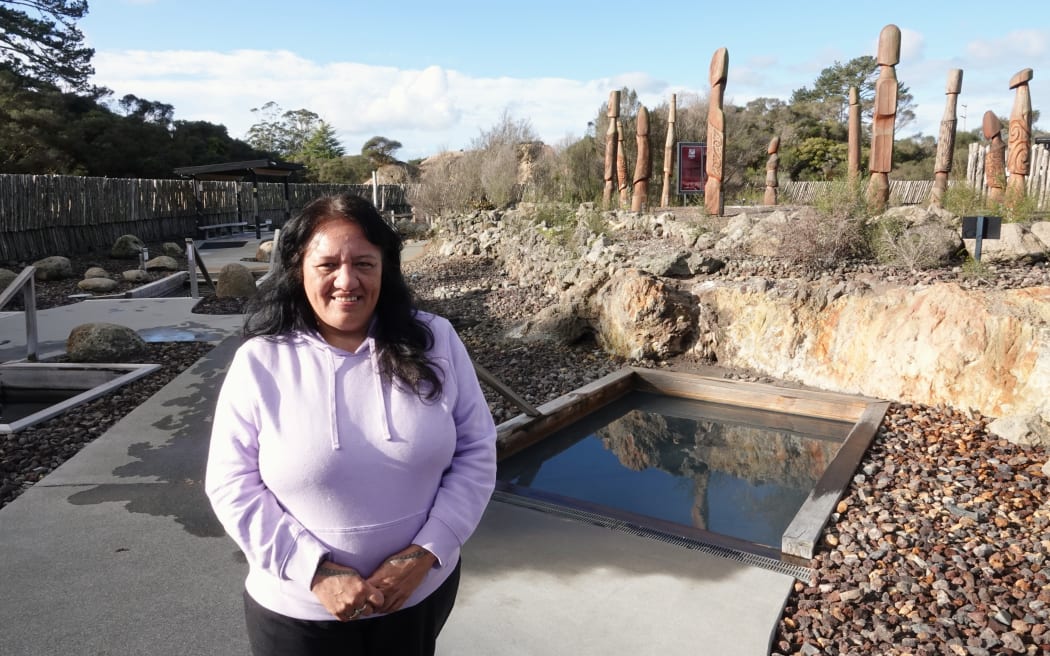Northland power cut investigation ramps up as businesses cry out for compensation
RNZ
08 July 2024, 1:18 AM
 Northland's two 220kV circuits are being carried on a "Lindsey tower" (right) and three single-pole towers until a replacement pylon is built. Photo: Supplied/Transpower
Northland's two 220kV circuits are being carried on a "Lindsey tower" (right) and three single-pole towers until a replacement pylon is built. Photo: Supplied/TranspowerMore than two weeks after a workplace mishap toppled a power pylon, an investigation into the region-wide outage that followed is stepping up a gear.
On Monday, the Electricity Authority announced the appointment of Sarah Sinclair, a top lawyer specialising in the infrastructure and energy sectors, to head an independent inquiry ordered by Energy Minister Simeon Brown after the 20 June blackout.
Businesses still want compensation after Northland power cut duration
The inquiry team is already gathering information from electricity retailers, lines companies and national grid operator Transpower, with the finished report due by 13 September.
Its findings will be made public 15 days later at the most.
Transpower is conducting its own investigation, which is due to be completed by the end of July.
After refusing to be drawn on the cause for days, chief executive Alison Andrew revealed on 24 June the pylon toppled when contractors carrying out routine maintenance unbolted three of its four legs at once.
A Transpower spokesman said a "Lindsey tower" - designed for emergency restoration of power networks - was installed three days after the pylon fell.
Three temporary single-pole towers, carrying the second 220 kilovolt circuit supplying Northland, were completed three days later.
The spokesman said no date had been set as yet for building a permanent, replacement pylon.
All four temporary structures were, however, robust and provided a secure power supply.
Meanwhile, Northland businesses are continuing to count the cost of the outage.
Most households had their power partially restored within seven hours, but the region's biggest power users - such as Fonterra's dairy plants at Kauri and Maungaturoto, and Golden Bay Cement at Portland - were unable to resume production until the following Monday.
Even many small businesses that had their power restored relatively quickly still lost two to three days of income.
Krishant Amin, of Paihia's Blue Door Restaurant, says the power cut had a huge effect on his business. Photo: RNZ/Peter de Graaf
Krishant Amin, of Paihia's Blue Door Restaurant, said the power cut occurred on a Thursday, ahead of what should have been a bumper weekend.
"We were scheduled for three back-to-back functions, but because of this huge power cut - from morning to the next day - all our stock which was stored in the fridge and the freezers was lost. It probably cost us $15,000 to $20,000," he said.
Amin said insurance would cover lost stock but it would not make up for three days of reduced trade.
The outage also meant restaurant staff were unable to give their guests the kind of experience they usually prided themselves on.
Amin hoped Transpower would step up and help businesses like his.
"Winter is already a tough time, and with the Brynderwyn closure it got even tougher. Something like this is the worst that can happen. Compensation would definitely help us to at least get back on our feet."
The iwi-owned Ngāwhā Springs hot pools, near Kaikohe, also lost significant income.
The pool complex, which is ironically next to Top Energy's geothermal power station, had its electricity restored at 8.30pm on the day of the outage.
However, operations manager Moana Cross said that did not mean the pools could reopen the following day.
"People think when the power goes off it just affects lights and things like that, but for us here at Ngāwhā it affects our pumps and the way we operate our pools here," she said.
Operations manager Moana Cross says the hot pools at Ngāwhā Springs lost up to two days’ worth of bookings. Photo: RNZ/Peter de Graaf
"We have pumps running all the time and when the power goes out everything just starts to overflow and mix together. And not only do we have to close, we have to take another day to clean the pools out and then they take half a day to fill.
"And while they're filling they get very hot, so we need at least another eight hours for them to get down to a temperature everyone can enjoy."
The pool complex had a backup generator but that was good only for outages of a few hours' duration.
Cross said many guests booked the following day were from out of town and did not have the option of returning another day, so they had to be refunded.
In winter, the busiest time of year, as many as 350 people per day could visit the pools - so closing could mean losing $10,000 or more a day.
Cross' message to Transpower was simple.
"Please keep the power on. It's vital to use here. Between our roads, our power and everything else, it's quite hard to operate businesses up here in the North. But we get by, we just push ahead for our communities," she said.
Northland's Chamber of Commerce has been spearheading the push for compensation for affected businesses, which, unlike households, are not covered by the Consumer Guarantees Act.
NorthChamber chief executive Darryn Fisher said members were still feeling frustrated when they met last Thursday for an update on compensation, and legal advice should discussions with Transpower falter.
Fisher said he had heard from restaurants that had lost major bookings in the days after the outage due to uncertainty over the power supply and the communications from Transpower.
"So while we might hear, 'Hey, you got your power back on seven hours later', the actual business impact was three or four days."
Discussions with Transpower were progressing well so far, Fisher said.
NorthChamber chief executive Darryn Fisher says businesses are still counting the cost of the blackout. Photo: RNZ/Peter de Graaf
"We're talking about multiple topics. One is what does direct compensation for business look like, and how can we get to a fair and reasonable number on that.
"There's also recognition of the ongoing brand damage to Northland and negative impact on business and investor confidence, and that's what we really need to reinvigorate. I think we'll get good support from Transpower on that in time as well."
For too long, Northlanders had accepted third-rate infrastructure as normal, he said.
"I know some people say, 'Hey, that's the compromise you have to put up with to live in such a beautiful place', but in this day and age I think that's really unfair and we need to shake that perception by creating a more robust and reliable region to live in."
Fisher said Northland businesses' message about the need for quality infrastructure would be reiterated when senior government ministers Chris Bishop and David Seymour visited the region this week.
"We know the government doesn't have a lot of money to throw around, but what we're looking for is the support to get on and do the work. It's a hand-up sort of conversation, not a hand out."
The terms of reference for the Electricity Authority inquiry are wide-ranging.
The inquiry, among other things, will look into the immediate causes of the outrage; risk assessment and mitigation; communication from Transpower to the public; the way power companies looked after medically dependent customers; and any lessons from the incident that could prevent it occurring again.
Sinclair, who will lead the independent review, chairs the law firm Minter Ellison Rudd Watts and is on the board of the New Zealand Infrastructure Commission, Te Waihanga.
A spokesman for the authority said the review team was analysing and assessing information it had requested from Transpower, lines companies and electricity retailers.
Information sought from Transpower included all information provided to its investigator, a detailed timeline of the event describing events, actions, and factors, its response and remediation, and planning and risk documents.
Initial estimates for the losses incurred by Northland businesses as a result of the outage range from Infometrics' figure of $60 million to NorthChamber's $80 million-plus.
This story was originally written by Peter de Graaf for RNZ News






